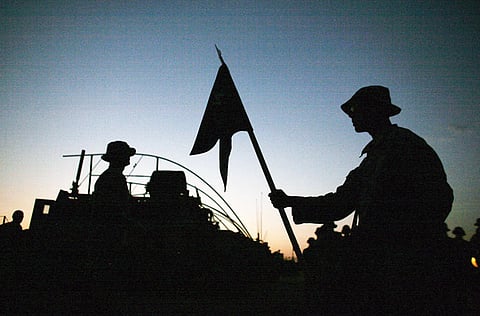US aims to make Iraq army strong
Bulk of America's military might is now focused on training armed forces of its former foe

Baghdad: Ten years ago the military machinations of Saddam Hussain were a security obsession for the United States, but American forces in Iraq now aim to make the army of their former foe stronger than ever.
The US army has the right to self-defence and has already used it, despite Washington's declaration that "combat operations" are officially over, but the bulk of America's military might is now focused on a training mission.
US money has paid for hundreds of workshops at Iraqi military bases, in the wake of the American-led invasion that ousted Saddam from power in 2003, part of the estimated trillion dollars that has been spent on operations here.
"If we want to have a strategic partner in Iraq, in this very critical nation, democracy, in the Middle East, it's the right thing to do, and we are partners," Lieutenant General Michael Barbero told AFP.
Barbero, the deputy commander for Operation New Dawn — the US "advise and assist" mission in Iraq, which on September 1 replaced Operation Iraqi Freedom — drew a parallel with the Second World War enemies Germany and Japan.
"If you look at history, I don't think this is very surprising at all," Barbero said. "They became strong allies with the US. I believe there will be a strong and strategic relationship between Iraq and the US after December 2011."
US training of local forces started in 2004, just months after the Coalition Provisional Authority (CPA), the post-invasion governing body headed by American diplomat Paul Bremer and charged with running the country, disbanded the Iraqi army.
Although the army was suspected as a refuge for Saddam's allies, its break-up is seen as one of the CPA's biggest mistakes as it made tens of thousands of armed men unemployed and left Iraq's borders unguarded, allowing insurgents to pour in and wreak havoc in subsequent years.
For Barbero and the now fewer than 50,000 American troops left in country, down from a peak figure of nearly 170,000 in 2007, the next 16 months should be dominated by the twin objectives of building up the Iraqi army to safeguard internal security and external borders.
"We are focusing our efforts to the professionalisation of the Iraqi security forces... providing them some very specialised skills," said Barbero, noting that Iraq currently has 440,000 police and 220,000 soldiers.
"For police forces, [it] is the crime scene investigation, canine teams, forensics laboratories, counter-explosive capabilities" that the US army must focus on, he said.
"Booby traps are still the number one threat in Iraq," said Lieutenant John Taylor during a recent police training session in Diyala province, where a huge range of sophisticated US military equipment had recently arrived.



